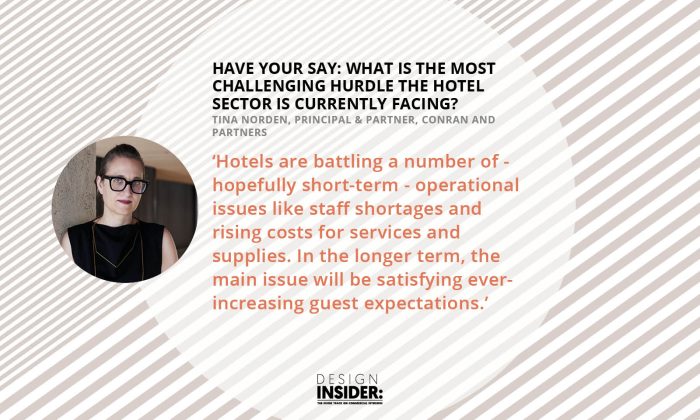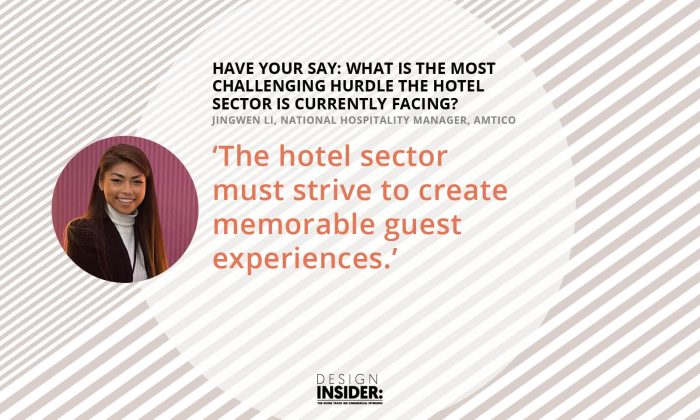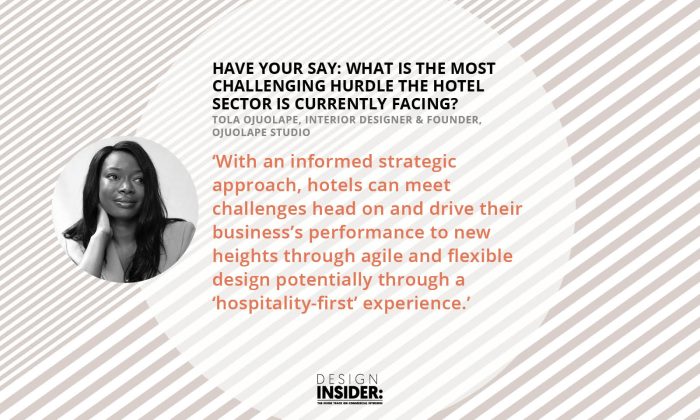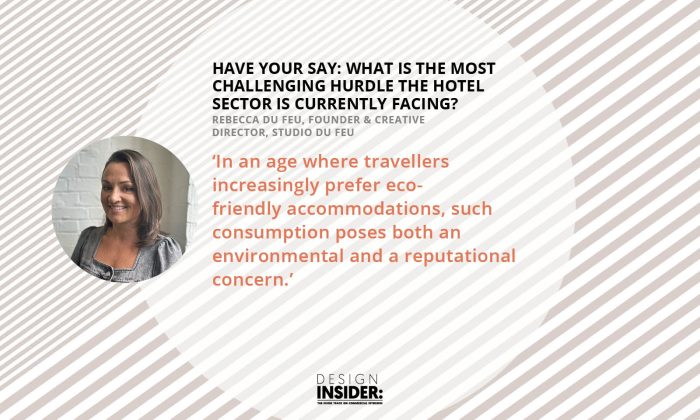Have Your Say: What is the most challenging hurdle the hotel sector is currently facing?
At Design Insider we recognise the expertise within commercial interiors and we are proud to instigate conversations which inform, challenge & inspire the people who make our sector thrive.
We started our summer campaign by looking in depth at the hospitality sector and we took the opportunity to ask leading commercial interior designers and suppliers to help us celebrate the current triumphs within the sector, we asked what is the most extraordinary thing happening in the hotel sector right now? You can read their answers here!
It’s not enough to simply look on the bright side, we must challenge and resolve areas which require improvement too. So, we are now pushing our conversation further by asking: What is the most challenging hurdle the hotel sector is currently facing?

Hotels are battling a number of – hopefully short-term – operational issues like staff shortages and rising costs for services and supplies. In the longer term, the main issue will be satisfying ever-increasing guest expectations.
Today, guests are much more educated and well-travelled in both the real and virtual world. As a result, they are much more sophisticated, with ever higher expectations from a place they choose to spend time and money in.
The cost of staying in hotels is also ever-increasing and at times eye-watering. Outside the elusive range of people to whom money doesn’t matter, the more we spend on a hotel, the more we expect – and the less we are willing to compromise on!
As designers we cannot really influence pricing (other than being careful with the capex budget) but we can be instrumental in creating experiences that inspire and spaces that engage our guests to satisfy the high expectations of today’s audience.
Tina Norden, Principal & Partner, Conran and Partners

The hotel sector must strive to create memorable guest experiences. To overcome this challenge, designers and specifiers need to strike a balance between aesthetics and functionality while meeting sustainability requirements – and flooring plays a crucial role. Materials such as luxury vinyl tile (LVT) offer a wide range of design options, can mimic the appearance of natural wood or stone and have excellent durability. Amid growing environmental concerns, the sector also faces increasing pressure to reduce venues’ carbon footprints; however, it is possible to balance design and sustainability by utilising bio-attributed, low-carbon LVT flooring.
Jingwen Li, National Hospitality Manager, Amtico

One of the biggest challenges that the hospitality industry is likely to face in 2023 is providing an exceptional experience that is tailored to each guest’s needs. Hotels must find ways to distinguish themselves and position their property as distinctive destinations for customers, to develop preferences and loyalty. With the rise in inflation, consumers have less disposable income, where they choose to spend becomes increasingly important. Experience and personalization are the new battlegrounds between competitor hotels.
With an informed strategic approach, hotels can meet challenges head on and drive their business’s performance to new heights through agile and flexible design potentially through a ‘hospitality-first’ experience: High-quality services, Local, personalised and beautiful environments for guests must be at the forefront in the industry’s DNA going forward.
Hotels have to meets demands of changing lifestyles who have needs and want to work around different types of people. Consumers want for purposeful, personalised spaces and care for the environment. Hotels can also use wellness and biophillia to create multi-purpose spaces that can be viewed as destinations – people, place and community are at the heart of the hotels and design plays a big part.
Tola Ojuolape, Interior Designer & Founder, Ojuolape Studio

The hotel industry, characterised by its global reach and constant operation, faces unique challenges in implementing sustainable practices. First and foremost, hotels consume vast amounts of energy for heating, lighting, and daily operations. In an age where travellers increasingly prefer eco-friendly accommodations, such consumption poses both an environmental and a reputational concern. Additionally, hotels generate significant waste, from food to single-use amenities, adding to landfills at an alarming rate.
Efforts to reduce this waste often clash with guest expectations for convenience and luxury. Water consumption, too, is notably high, with laundry services and guest facilities contributing to overuse. Implementing renewable energy sources, efficient waste management, and water-saving systems demands significant investment, further complicated by the diverse and often fragmented ownership structures in the industry. However, as sustainability becomes a decisive factor for modern consumers, the hotel industry must overcome these hurdles to ensure future success and environmental harmony.
Studio du Feu prioritises the environment by meticulously selecting sustainable materials for its designs, ensuring minimal impact on our planet. Beyond material choice, they also focus on the longevity of their creations, believing that lasting designs reduce waste and promote a more sustainable future for all.
Rebecca du Feu, Founder & Creative Director, Studio du feu
We are seeing an influx of speciality tourism categories; sleep, wellness, eco and experience to name a selection. So, for our September Have Your Say article we are asking: What is your experience with these growing niche markets and what is their impact on the hospitality sector?
We would love to publish your opinion, please email your answer (50-150 words), name, title, company and portrait to alys@designinsiderlive.com Copy deadline 7th September.





